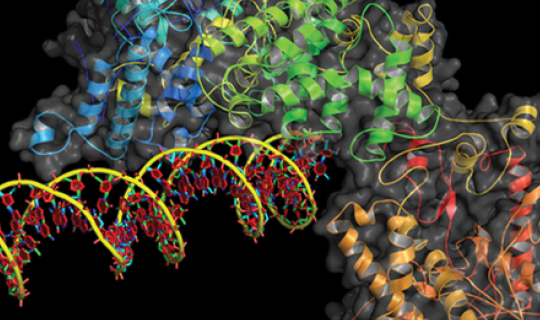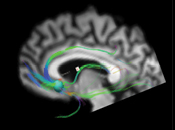If this message displays incorrectly, please view the web page

JUNE 19, 2014 Research Extras |
 |
||
| The Cas-9 enzyme is part of a gene editing system that could make precise changes in DNA to repair disease-causing mutations. | ||
IMMUNOLOGY
CRISPR Gene-Editing System Leading to Innovations
in Lab and Clinic
Originally discovered by researchers in the dairy industry, the CRISPR system allows precise changes in the genome that could help scientists better understand the functions of genes and also target genetic mutations to treat disease. Read more...
 |
| Electrodes are placed at precise locations in the brain for treatment of severe depression. |
Precise Brain Mapping Improves Deep Brain Stimulation for Depression
Deep brain stimulation (DBS) within the brain's white matter is effective for many patients with treatment-resistant depression. But a new study shows response to therapy can be significantly improved by mapping and fine-tuning the placement of DBS contacts to involve a specific network of white matter connections in the brain. Read more...
 |
| Researchers say children with autism need special attention from physicians to detect GI distress |
Children with Autism Have More GI Disorders
Children with autism spectrum disorder are at least four times more likely to experience gastrointestinal problems than their peers. A new study, which confirms anecdotal reports, reinforces the need for new clinical guidelines and standardized screening for children with autism, especially those who are non-verbal. Read more...
 |
| Cardiac muscle from a 15-day-old mouse shows proteins (in red) involved in cell division. |
Growth Spurt in Young Heart Muscle Cells Could Help Childhood Treatment
Scientists have long believed that heart muscle cells don't divide after the first few days of life. New research in mice shows a major spurt of heart cell division early in life (corresponding to human age five), driven by a surge of thyroid hormone. The discovery could lead to new therapies for pediatric heart disease. Read more...
Link to current issue | Archives | More Research News | Contact Us
Editor, Holly Korschun, Director of Research Communications
Managing Editor, David S. Stephens, MD, Vice President for Research